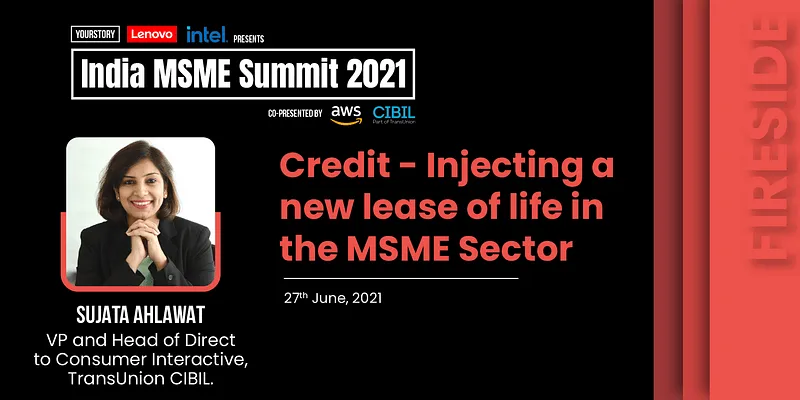[India MSME Summit 2021] Why MSMEs should stay updated about government credit initiatives, invest in the future
At YourStory’s third annual India MSME Summit, Sujata Ahlawat, VP and Head of Direct to Consumer Interactive of TransUnion CIBIL, shares tips on maintaining a robust CIBIL rank and availing credit during these desperate times.
Even as the coronavirus pandemic severely impacted the global economy, the MSME sector has had to grapple with unprecedented challenges. Many businesses were forced to pivot and reassess their business plans, but for so many others, this simply wasn’t an option.
At YourStory’s third annual India MSME Summit, Sujata Ahlawat, VP and Head of Direct to Consumer Interactive of TransUnion CIBIL, spoke to senior anchor Priya Sheth. She said the struggles have not gone unnoticed, as the government has launched numerous initiatives to enable MSMEs to get on the road to recovery.
“I think a lot of them are now more comfortable, with better access to working capital. There is slightly more infusion in the market, and more cash flows to meet the daily expenses, thanks to the government initiatives, which have aided the root of recovery as we see today,” she shared.
Impact of the pandemic waves
Sujata shared that MSMEs experienced different impact levels in the first and the second waves of the pandemic. The first wave saw unprecedented conditions and some adjustments to the new normal, along with the adoption of digital transformation to meet new requirements.
“In the second wave, despite the government initiatives, a lot of savings would have been used up. This has led to slightly higher impact,” she said.
“However, from an economic standpoint, we are better prepared now, because with vaccination happening at a large scale, I think we are well equipped to wade through the second wave, as we see today,” she added.

Challenges in procuring credit
Additional challenges that small businesses in particular faced is procuring or seeking credit.
According to Sujata, a dearth of timely and affordable formal credit has kept the sector from realising its true potential.
“As cash flow stops, small businesses struggle to invest in technology to upskill the workforce. So, MSMEs now need to stay updated with various government initiatives like the Emergency Credit Line Guarantee Scheme (ECLGS 4.0) and the insolvency package that aims to ease these challenges in accessing proper credit,” she said.
Another challenge from the MSME standpoint is uncertainty in availing credit from a formal or informal lending system. But, with the RBI, and the government championing the cause of MSME business owners, she said that many banks today offer business loans at competitive rates, making it much more cost-effective for MSMEs to opt for the same.
The third and the most important challenge, according to Sujata, is to get credit at reasonable terms. “Getting the right information, and going to the right sources is extremely important,” she said. Sujata also emphasised on the need to keep company documentation ready, be it tax returns or credit statements, no matter how small or big the organisation. It fast tracks the access to credit, she said.
On CIBIL ranks and availing credit
“CIBIL rank between four to one is a positive sign of a company's credit health. It is a critical factor in getting access to credit, whether they are getting what they deserve, through different financial institutions, or getting credit at a cheaper rate,” said Sujata. She added that the CIBIL ranking is paving the way for growth for most of the MSMEs.
From the TransUnion perspective, a key focus area is financial inclusion and ensuring that consumers and businesses have access to the credit that they need the most. It is trying to approach this with a two-pronged approach – educate and facilitate.
Meanwhile, for lenders, the rank talks about how structurally sound a business is, which gives them a lot of confidence in that business. Maintaining a good credit score becomes an important factor, and Sujata shared some tips on how to sustain it -
“Ideally, MSMEs should strive to pay lenders on time and within the credit window, however, given the current scenario, there are ways to optimise cash flows to meet their expenses,” she said.
“It's also important to consult financial advisors to monitor government schemes and find the most cost-effective credit opportunity that might come to them. In addition, MSMEs also need to start taking charge of their credit profile while banks continue to monitor it,” she said.
Edited by Anju Narayanan


![[India MSME Summit 2021] Why MSMEs should stay updated about government credit initiatives, invest in the future](https://images.yourstory.com/cs/21/604090802d6d11e9aa979329348d4c3e/Imagelf0l-1624798513958.jpg?mode=crop&crop=faces&ar=2%3A1&format=auto&w=1920&q=75)
![[India MSME Summit 2021] How automation is paving the way for ‘industrial revolution 4.0’ in India](https://images.yourstory.com/cs/21/e1da3a20368f11ea8ceed32dbcb77ccc/ArticleTheriseofautomationinMSMEmanufacturing-03-1624540404607.png?fm=png&auto=format&h=100&w=100&crop=entropy&fit=crop)
![[India MSME Summit 2021] How MSMEs have adopted BFSI and contactless payments amidst second wave of COVID-19](https://images.yourstory.com/cs/21/98e25df018b511e988ceff9061f4e5e7/Image9a03-1624367480345.jpg?fm=png&auto=format&h=100&w=100&crop=entropy&fit=crop)




